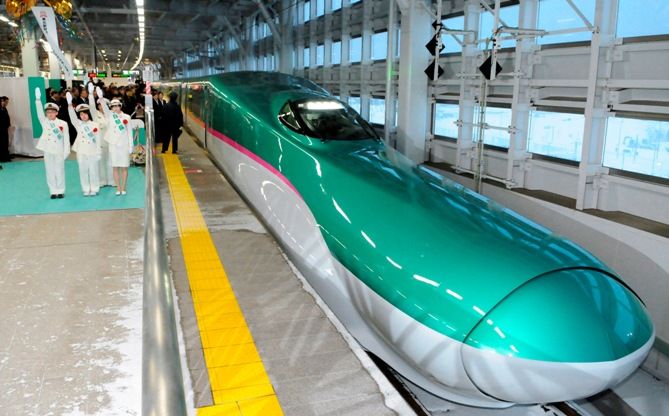Prime Minister Narendra Modi's loyalty to his home state, Gujarat, is admirable but an Ahmedabad-Mumbai bullet train will not begin to address any of the many problems Indian Railways faces, notes Sunanda K Datta-Ray.

India needs a Rs 98,000-crore (Rs 980 billion) bullet train as much as it needs smart cities and e-governance.
Yes, India does desperately need cities that are livable and not victims of deadly floods and poisonous pollution.
India also needs governance instead of lawlessness, anarchy and religious bigotry.
Similarly, clean, safe and comfortable trains that run on time would suffice for a nation that seems frenetically anxious to run before it can even totter.
This may sound like looking a gift horse down the mouth.
But an important event like this week's three-day visit by Shinzo Abe, Japan's prime minister, shouldn't be squandered on feeding the vanity of politicians or giving the ruling party a propaganda edge over rivals.
A cursory look at the historical record shows that relations with Japan are especially important as an index of India's economic consequence. Nobusuke Kishi became Japanese prime minister in February 1957, and visited India in May that year.
Hayato Ikeda succeeded Kishi in July 1960, and visited India in November that year.
It was 23 years before another Japanese prime minister, Yasuhiro Nakasone, thought New Delhi important enough for a visit.
Then, as the global situation changed, and India tentatively responded to altered conditions, Toshiki Kaifu travelled to New Delhi on the eve of the P V Narasimha Rao-Manmohan Singh reforms.
The first two visits in quick succession, the 23-year interval, and then the shorter gap of six years, provided a thermometer of India's economic health.
The real upturn didn't happen until December 2006 when Singh, prime minister by then, visited Tokyo during Abe's first term as prime minister - Japan's youngest since World War II and the first to be born after peace was established.
The Joint Statement Towards Japan-India Strategic and Global Partnership they signed paved the way for Abe's "Hand in Hand with the World" slogan and for Japanese funding of many Indian infrastructure projects.
The Japanese are rightly proud of their contribution to Delhi's sleek Metro. Indians were welcomed to the Japan Exchange and Teaching Programme, and in 2007 (India-Japan Friendship Year) Japan's navy, sorry, self-defence forces, joined Indian warships in a collective exercise in the Indian Ocean, with the Australian, Singaporean and American navies, which at once raised Chinese hackles.
Economic engagement improved significantly after both countries signed a Comprehensive Economic Partnership Agreement in 2011.
Recognising Singh's contribution to the Indo-Japan friendship, Tokyo honoured him with the Grand Cordon of the Order of the Paulownia Flowers.
But undoubtedly Narendra Modi took the partnership - loftily renamed Special Strategic and Global Partnership - to new heights last year when Japan announced that investment would be doubled to about $34 billion over five years.
Modi and Abe also agreed to enhance defence and strategic cooperation while speeding up negotiations on a civil nuclear deal.
But restoring the relationship is one thing, making the best use of Japanese money and expertise another.
Not that Modi is the first politician to be dazzled by new gadgets and gimmicks.
Even Jyoti Basu, whose background and education encouraged expectations of greater sophistication, claimed Calcutta's streets wouldn't be clean until a motorised cleaning system he had seen in Scandinavia was imported.
No one asked how simple jemadars armed with brooms and water pipes managed to do the job in British India.
By that token, the elaborate and expensive fanfare of Swachh Bharat wouldn't have been necessary if the armies of sweepers employed in every government establishment had been forced to do the work for which they are paid. But that wouldn't have been popular with the rank and file.
It would also have deprived the prime minister of a stunt to rally the hordes, who acclaimed Swachh Bharat as the most brilliant initiative since Independence.
With 23 million passengers travelling on its 65,000 km of track, Indian Railways is crying out for new equipment and trained and disciplined staff. Nowhere else is lower class travel so disagreeable.
Trains are dirty and delayed. There are technical reasons why they move so bumpily. Signalling systems have been known to fail.
My experience convinces me that not only has the Indian Railway Catering and Tourism Corporation never heard of hygiene, but also that it takes no notice of newspaper criticism.
Filth and unpunctuality were the main reasons why luxury pilgrim trains to various Buddhist shrines failed to attract Japanese tourists.
Modi's loyalty to his home state is admirable but an Ahmedabad-Mumbai bullet train will not begin to address any of the many problems Indian Railways faces.
It will be an extravagant way of thanking Gujarati voters.









